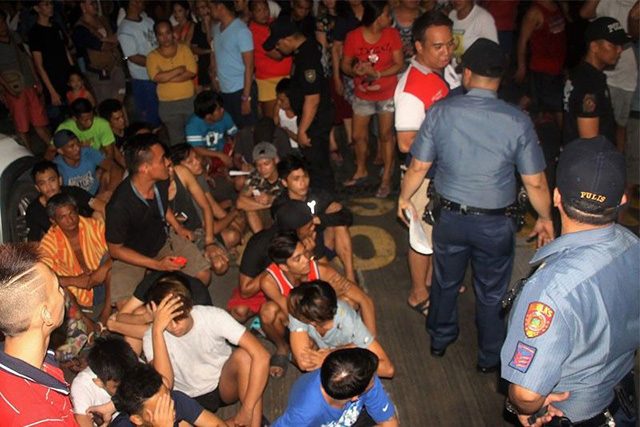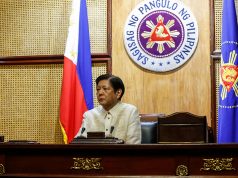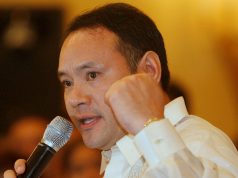
President Rodrigo Duterte has ordered a general crackdown on “tambays” or loiterers on the streets but the directive aimed at reducing street crime is actually raising concerns from Filipinos.
The president declared that he will impose stricter measures to deal with “tambays” because “they are potential trouble for the public,” showing his tough stance on criminality.
Here’s the problem with the order:
1. People are automatically assumed as criminals
One Twitter user noted that people can now be arrested on the “mere possibility that you will commit a crime” under the directive.
Previously, police officers from Makati were relieved from duty after falsely arresting people who were simply waiting outside their friend’s house at around 11 p.m.
JAIL TIME FOR THESE “TAMBAYS.” A first-person account by Ttam Nanaramid of a patently illegal detention by Makati police…
Posted by Eric Cabahug on Saturday, June 16, 2018
2. It tends to be anti-poor
Others claimed that the directive is “anti-poor” since the authorities are not arresting “tambays” in subdivisions and gated communities—similar with his “War on Drugs” campaign.
Ang biases na'to ang dahilan kung bakit gaya ng "drug war" na sa totoo lang ay war vs the poor, ang "anti-tambay" campaign ay anti-mahirap campaign. Di hamak na mas mataas ang posibilidad na maaresto ang lalaking nainom sa Krus Na Ligas kesa lalaking nainom sa loob ng Forbes Park
— #BabaeAko ? Let's #RiseUpTogether ?️? (@highreaching) June 21, 2018
3. It tends to violate civil liberties
Former Solicitor General Florin Hilbay said that the anti-“tambay” order curtails the person’s “right to liberty, association (and) due process.”
Ang paghuli sa mga “tambay” ang siya mismong paglabag sa karapatang pantao nila.
This violates right to liberty, association, due process; it is anti-poor and encourages profiling. The only possible basis for such arrests–vagrancy–has been repealed by RA 10158.
Anuba. https://t.co/40n4JWqFQG
— florin hilbay (@fthilbay) June 18, 2018
He mentioned that a person can only be arrested for vagrancy but noted that it was decriminalized under RA 10158.
Vagrancy is defined under Article 202 of the Revised Penal Code as the following:
- Any person having no apparent means of subsistence, who has the physical ability to work and who neglects to apply himself or herself to some lawful calling;
- Any person found loitering about public or semi-public buildings or places or trampling or wandering about the country or the streets without visible means of support;
- Any idle or dissolute person who ledges in houses of ill fame; ruffians or pimps and those who habitually associate with prostitutes;
- Any person who, not being included in the provisions of other articles of this Code, shall be found loitering in any inhabited or uninhabited place belonging to another without any lawful or justifiable purpose;
On 2012, the crime was no longer listed under an amendment to the certain article. RA 10158 removed vagrancy and only retained prostitutes as those warranted to be arrested.
Rights group Karapatan condemned Duterte’s anti-“tambay” directive and said that it is “patently illegal.”
Commission on Human Rights added that it may be violating people’s right to mobility and instigating a culture of fear.
4. There’s no clear definition of ‘tambay’
According to Duterte, he simply wanted to make the streets safer and intensify the government’s crime preventive measures.
He said in a speech, “Wala namang inaaresto. I just don’t want you using the streets to loiter. ‘Yung utos ko sa pulis na ‘yung mga tambay. Sundin lang ninyo ‘yung utos ko.”
His vague words, however, have raised concerns on social media, where people questioned his own definition of “tambay.”
Wait ano ba yung very definition ng tambay? Paano kung nasa isang spot ako for more than 10 minutes dahil nagaabang ako ng jeep, tambay na ba ako nun? https://t.co/SNXTpoXTHy
— Purifica Octavia Alejandro (@Nicocoleeta) June 21, 2018
“Tambay” is the Filipino slang for “standby” or people who are idling. Philippine National Police Chief Director General Oscar Albayalde explained, “Ang sinasabing standby, it’s a common word lang ang pagkasabi.”
“Pero kung titingnan natin ang pinaghuhuli nila, they have specific cases, they have specific violations and not the word ‘standby’ ang kanilang kaso.”
Presidential spokesperson Harry Roque Jr. clarified that Duterte’s words were specifically meant to strictly enforce city ordinances for crime prevention.
Meanwhile, PNP noted that they still have to finalize a policy that would consolidate all city ordinances.









